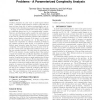337 search results - page 33 / 68 » Game Theory Using Genetic Algorithms |
134
click to vote
ATAL
2010
Springer
15 years 3 months ago
2010
Springer
We propose Path Disruption Games (PDGs), which consider collaboration between agents attempting stop an adversary from travelling from a source node to a target node in a graph. P...
142
click to vote
AAMAS
2007
Springer
15 years 8 months ago
2007
Springer
Learning Automata (LA) were recently shown to be valuable tools for designing Multi-Agent Reinforcement Learning algorithms. One of the principal contributions of LA theory is that...
136
Voted
GECCO
2005
Springer
15 years 7 months ago
2005
Springer
Evolutionary Algorithms (EAs) have been largely applied to optimisation and synthesis of controllers. In spite of several successful applications and competitive solutions, the st...
107
click to vote
WABI
2001
Springer
15 years 6 months ago
2001
Springer
Radiation hybrid (RH) mapping is a somatic cell technique that is used for ordering markers along a chromosome and estimating physical distances between them. It nicely complements...
141
Voted
ATAL
2009
Springer
15 years 9 months ago
2009
Springer
Coalition formation is a key topic in multi–agent systems (mas). Coalitions enable agents to achieve goals that they may not have been able to achieve independently, and encoura...

